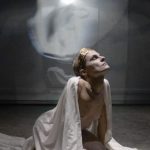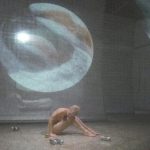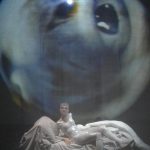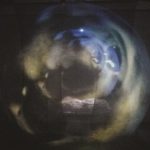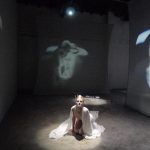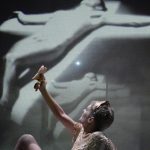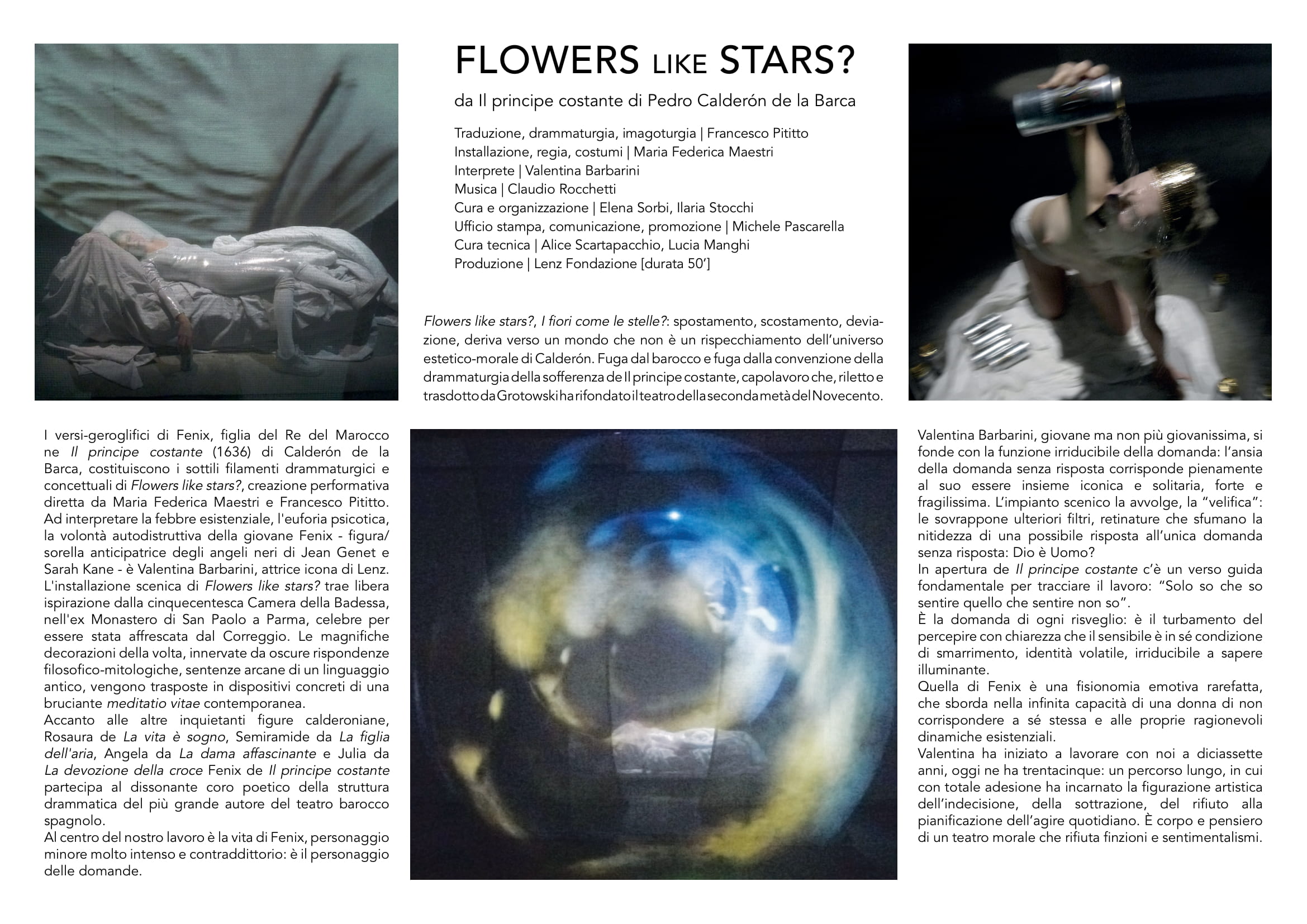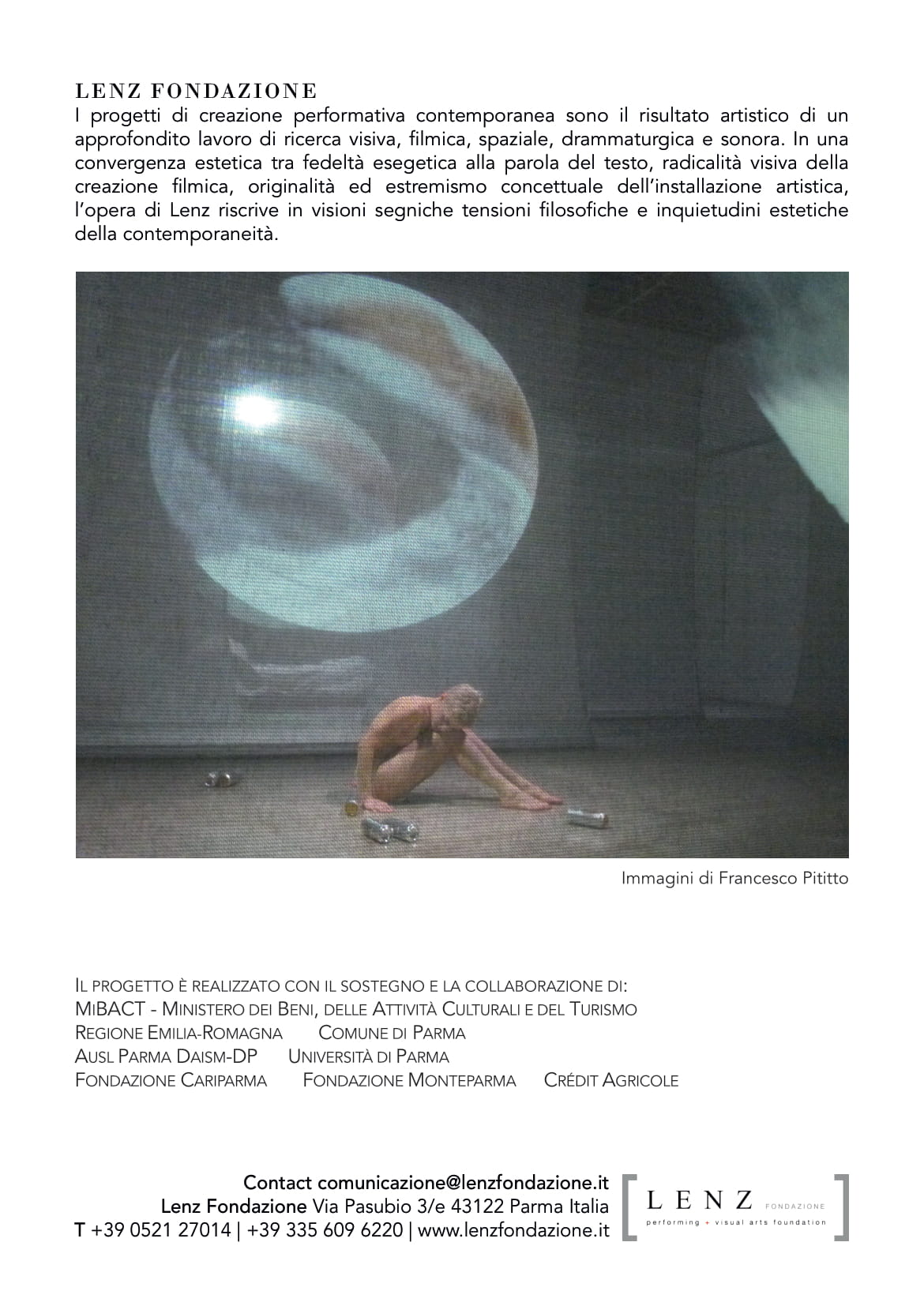
FLOWERS LIKE STARS?
The hieroglyphic verses of Fenix, daughter of the King of Morocco The constant prince (1636) by Calderón de la Barca, constitute the subtle dramaturgical and conceptual filaments of Flowers like stars?, the new performative creation directed by Maria Federica Maestri and Francesco Pititto. To interpret the existential fever, psychotic euphoria, the self-destructive will of young Fenix – anticipatory figure/sister of the black angels of Jean Genet and Sarah Kane – and Valentina Barbarini, iconic actress from Lenz.
The scenic installation of Flowers like stars? draws free inspiration from the sixteenth-century Chamber of the Abbess, in the former Monastery of San Paolo in Parma, famous for having been frescoed by Correggio. The magnificent decorations of the vault, innervated by obscure philosophical-mythological correspondences, arcane sentences of an ancient language, are transposed into concrete devices of a burning the meditation of life Contemporary.
Alongside the other disturbing Caldronian figures, Rosaura of Life is a dream, Semiramis from The daughter of the air, Angela yes The charming lady and Julia da The devotion of the cross Fenix de The constant prince participates in the dissonant poetic chorus of the dramatic structure of the greatest author of Spanish baroque theatre.
Valentina Barbarini, interpreter from 2005 of Lenz's most important creations, she has already shown herself as a fragmented and fragile female power in the guise of Fenix ne The constant prince by Calderón de la Barca, in an installation created in Italy, Spain and Morocco in 2006. In Radical Change – project on Metamorphosis of Ovid (2007) – interpreted a further refraction of the Phoenix, the sacred bird that, having reached the age of five hundred years, lays its limbs in a nest, then die. From the ashes of his body another small Phoenix will then be born in an eternal cycle of life-death. Flowers like stars? represents one of these infinite rebirths, in a monumental place for beauty and history, equally immortal.
What's the point of beauty? / if I miss the joy, / if I lack luck?
What today is melancholy, / Maybe it's just my sadness.
Only I know that I know how to feel / I don't know what to feel, / what an illusion of the soul this is.
Flowers like stars?, Flowers like stars?: shift, deviation, deviation, it drifts towards a world that is not a reflection of Calderón's aesthetic-moral universe. Escape from the baroque and escape from the convention of the dramaturgy of suffering Il constant prince, masterpiece that, reread and transduced by Grotowski it re-founded the theater of the second half of the twentieth century.
At the center of our work is Fenix's life, very intense and contradictory minor character: he is the character of the questions.
Valentina Barbarini, young but no longer very young, it merges with the irreducible function of demand: the anxiety of the unanswered question fully corresponds to its being both iconic and solitary, strong and very fragile. The stage system envelops her, “velifies” her: it superimposes further filters on it, screenings that blur the clarity of a possible answer to the only unanswered question: God is Man?
In the opening of The constant prince there is a fundamental guiding verse for tracing the work: “Only I know that I know how to feel what I don't know how to feel”. E’ the question of every awakening: it is the disturbance of clearly perceiving that the sensitive is in itself a condition of bewilderment, volatile identity, irreducible to enlightening knowledge. Fenix's is a rarefied emotional physiognomy, which overflows into the infinite capacity of a woman to not correspond to herself and her own reasonable existential dynamics. Valentina started working with us at seventeen, today he is thirty-five: a long journey, in which with total adhesion he embodied the artistic figuration of indecision, of the subtraction, of the refusal to plan daily actions. E’ body and thought of a moral theater that rejects fictions and sentimentality.
Valentina Barbarini she was the interpreter of numerous important productions by Lenz: The little Mermaid, The constant prince, High surveillance, The imprint of a god, Daphne_you must be my tree, Radical change_Phoenix, Chaos, Hand us over, girl, your eyes, Poliante, Exile, Exile_La grande cicatrice, The box, Aeneas, Aeneas in Italy, The Isle of Dogs_Bruciando, The glory, The betrothed, Verdi Re Lear, Hyperion, The Furious, Romeo and Juliet_concert, Auto-da-fé, Paradiso, Purgatory, Verdi Macbeth, The great theater of the world, Iphigenia in Aulis, Oresteia.
FLOWERS LIKE STARS?
and The constant prince by Pedro Calderon de la Barca
Translation, playwriting, imagoturgy | Francesco Pititto
Installation, regia, costumes | Maria Federica Masters
Interpreter | Valentina Barbarini
Musica | Claudius Rocchetti
Care and organization | Elena Sorbi, Ilaria Stocchi
Press office, communication, promotion | Michele Pascarella
Technical care | Alice Scartapacchio
Technical assistant | Marco Cavellini
Media video | Doruntina Film
Production | Lenz Foundation
Duration | 50 minutes
teaser:
trailer:
https://vimeo.com/422377552
whole wheat:
The muscular and androgynous body of Valentina Barbarini moves in a scenic installation freely inspired by the Abbess's Chamber frescoed by Correggio in the former Monastery of San Paolo in Parma, whose sibylline philosophical-mythological correspondences are translated into ephemeral images and boneless words projected onto veil screens [more].
Emanuela Zanon, Juliet Art Magazine
The performative construction is radical but, while constantly showing tension towards risk, the body is never reduced to mechanics – as often happens in sterile compositions passed off as contemporary art - and inhabiting the scene is never from a passive shell, despite the stage ecology forcing him to continually genuflect, from which it will be increasingly difficult to get up stoically [more].
Daniele Rizzo, Persinsala







